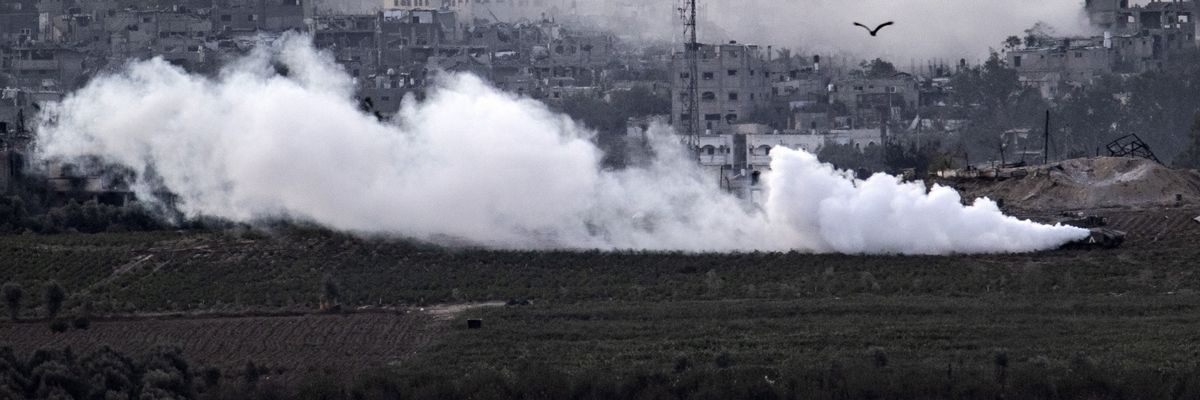The widespread destruction Israel's military has inflicted on Gaza's farmland and agricultural infrastructure amounts to a "deliberate act of ecocide," according to a new investigation that uses satellite imagery to survey the extent of the damage.
Released Friday ahead of Palestine's Land Day, the analysis by the London-based research group Forensic Architecture (FA) shows that Israel's ground forces—including tanks and other military vehicles—have advanced over half of Gaza's farms and orchards, critical food sources that the besieged enclave's population has worked tirelessly to cultivate in the face of decades of occupation.
"Since 2014, Palestinian farmers along Gaza's perimeter have seen their crops sprayed by airborne herbicides and regularly bulldozed, and have themselves faced sniper fire by the Israeli occupation forces," FA said. "Along that engineered 'border,' sophisticated systems of fences and surveillance reinforce a military buffer zone."
Comparing satellite imagery from prior to Israel's invasion and the present, FA found that roughly 40% of Gaza land that was previously used for food production has been destroyed by Israeli forces. Nearly a third of Gaza's greenhouses have been demolished, according to the investigation.
"In total, Forensic Architecture has identified more than 2,000 agricultural sites, including farms and greenhouses, which have been destroyed since October 2023, often to be replaced with Israeli military earthworks," the group said. "This destruction has been most intense in the northern part of Gaza, where 90% of greenhouses were destroyed in the early stages of the ground invasion."
It is no surprise, then, that northern Gaza is currently experiencing famine conditions, with most of the population there at imminent risk of starvation as Israeli forces impede the flow of humanitarian assistance and continue their relentless bombing campaign.
Leading human rights organizations have accused the Israeli government of using starvation as a weapon of war in Gaza, pointing to the decimation of the territory's agricultural sector and attacks on aid convoys. The United Nations warned less than two months into Israel's assault that "in the north, livestock is facing starvation and the risk of death due to shortage of fodder and water."
The new investigation was published amid growing global momentum to formally codify ecocide as an international crime alongside genocide, which Israel also stands accused of committing against Palestinians in Gaza.
An expert panel convened by Stop Ecocide International has defined ecocide as "unlawful or wanton acts committed with knowledge that there is a substantial likelihood of severe and either widespread or long-term damage to the environment being caused by those acts."
Ecocide is officially recognized as a crime in at least 10 countries, including France, Ecuador, Russia, and Ukraine. Earlier this week, the European Council adopted new rules that include a provision criminalizing acts deemed "comparable to ecocide."
FA's analysis argues that Israel's latest military assault on the Gaza Strip and the intentional targeting of the enclave's agriculture is "a critical dimension of Israel's genocidal campaign," fueling both a humanitarian and environmental disaster.
"The targeted farms and greenhouses are fundamental to local food production for a population already under a decades-long siege," the research group said. "The effects of this systematic agricultural destruction are exacerbated by other deliberate acts of deprivation of critical resources for Palestinian survival in Gaza."
"These acts include the well-reported, catastrophic, and Israeli-made famine ongoing in Gaza, continued obstruction of humanitarian aid destined for Gaza, the destruction of medical infrastructure, the destruction beyond repair of other areas of civilian infrastructure, including bakeries, schools, mosques, churches, and cultural heritage sites," the group added.




